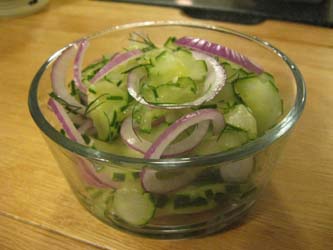Cucumber originated in India.[2][3] Large genetic variety of cucumber has been observed in different parts of India.[3] The cucumber has been cultivated for at least 3,000 years in Western Asia, and was probably introduced to other parts of Europe by the Romans. Records of cucumber cultivation appear in France in the 9th century, England in the 14th century, and in North America by the mid-16th century.
Earliest cultivation
The cucumber is believed to be native to India, and evidence indicates that it has been cultivated in Western Asia for 3,000 years. The cucumber is also listed among the foods of ancient Ur and the legend of Gilgamesh describes people eating cucumbers. Some sources also state that it was produced in ancient Thrace, and it is certainly part of modern cuisine in Bulgaria and Turkey, parts of which make up that ancient state. From India, it spread to Greece (where it was called “vilwos”) and Italy (where the Romans were especially fond of the crop), and later into China.
The fruit is mentioned in the Bible (Numbers 11:5) as having been freely available in Egypt, even to the enslaved Israelites: We remember the fish, which we did eat in Egypt freely/the cucumbers, and the melons, and the leeks, and the onions, and the garlic.
The Israelites later came to cultivate the cucumber themselves, and Isaiah 1:8 briefly mentions the method of agriculture - The Daughter of Zion is left/like a shelter in a vineyard/like a hut in a field of melons/like a city under siege. The shelter was for the person who kept the birds away, and guarded the garden from robbers.
Roman Empire
The Roman Emperor Tiberius had the cucumber on his table daily during summer and winter. The Romans reportedly used artificial methods (similar to the greenhouse system) of growing to have it available for his table every day of the year. They would be wheeled out in carts to sit in the sun daily, then taken in to keep them warm, stored under frames or in cucumber houses glazed with oiled cloth known as “specularia”.
Pliny the Elder describes the Italian fruit as very small, probably like a gherkin, describing it as a wild cucumber considerably smaller than the cultivated one. Pliny also describes the preparation of a medication known as “elaterium”, though some scholars believe that he refers to Cucumis silvestris asininus, a species different from the common cucumber.[4] Pliny also writes about several other varieties of cucumber, including the Cultivated Cucumber,[5] and remedies from the different types (9 from the cultivated, 5 from the "anguine", and 26 from the "wild". The Romans are reported to have used cucumbers to treat scorpion bites, bad eyesight, and to scare away mice. Wives wishing for children wore them around their waists. They were also carried by the midwives, and thrown away when the child was born.
In the Middle Ages;
Charlemagne had cucumbers grown in his gardens in ninth-century France. They were reportedly introduced into England in the early 1300s, lost, then reintroduced approximately 250 years later.
Christopher Columbus Brings Cucumbers to the New World:
The Spaniards (in the person of Christopher Columbus) brought cucumbers to Haiti in 1494. In 1535, Jacques Cartier, a French explorer, found “very great cucumbers” grown on the site of what is now Montreal.
From Wikipedia
Recipe and Links
|


